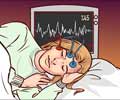Alternating skimpy sleep with longer sleep hours affects attention, creativity in young adults
Highlights
- Good sleep quality is essential for cognition, physical and mental well-being, and creativity factors.
- Variability in night to night sleep patterns affect cognition in young adults.
- This affects the attention and creativity in young adults or students who have to deal with term assignments or major work-related projects.
"When completing term projects, students restrict sleep, then rebound on sleep, then repeat," he said. "Major projects which call for numerous tasks and deadlines -- more so than for tests -- seem to contribute to sleep variability."
Studying Interior Design Students
Interior design is "a strange culture, one where sleep deprivation is almost a badge of honor," said lead author Elise King, assistant professor of interior design in Baylor's Robbins College of Health and Human Sciences.
The tradition in interior design is generally believed to be to stay up late to work in order to unleash creativity and prepare them for their careers.
"Since the general public still doesn't understand the profession of interior design, and mistakenly thinks we're the same as decorators, there is a sense that you want to work harder and prove them wrong," King said. "But recently, we've seen the consequences of that type of thinking: anxiety, depression and other mental health issues -- and also the dangers of driving while sleep deprived."
The Baylor study recruited 28 interior design students. Sleep was measured using actigraphy with students wearing wristbands to track movement. Students also kept daily diaries on the quantity and quality of their sleep.
Participants completed two cognitive testing sessions, each an hour long, for creativity and executive attention.
"What we call 'creativity' is often people's ability to see the link between things that at first glance seem unrelated, and one of the tests taps into that ability," Scullin said.
Executive attention is the "working" memory that enables people to hold memories for a short time while doing a separate task.
The study found that irregular sleep affects:
- executive attention that is important for intense focus for planning, making decisions, correcting errors and dealing with novelty
- creativity
Only one participant in the study slept for seven hours or more nightly and 79% slept fewer than seven hours at least three nights during the week.
"Most students think they're getting about four more hours of sleep each week than they actually are," Scullin said.
King said. "The stress of juggling several projects, each with multiple deadlines, is likely to contribute to students' tendency to cycle between several days of poor sleep leading up to a project due date, followed by a catch-up day with 10 or more sleep hours." King said.
The findings can be validated by further investigation with a greater range of students across multiple studio-based majors and multiple universities.
"Interior design programs are changing," King said. "People are open to the conversation and willing to discuss ways to reduce that pressure on our students and encourage them to be healthier."
The study of interior design students is published online in the Journal of Interior Design.
Reference
- Elise King et al. Sleep in Studio Based Courses: Outcomes for Creativity Task Performance. Journal of Interior Design; (2017) DOI: 10.1111/joid.12104
Source-Medindia
















